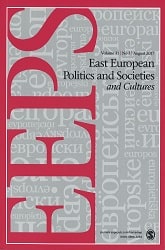Between Contextualization and Comparison: A Thorny Relationship between East European Studies and Disciplinary “Mainstreams”
Between Contextualization and Comparison: A Thorny Relationship between East European Studies and Disciplinary “Mainstreams”
Author(s): Jan KubikSubject(s): Political Philosophy, Methodology and research technology, Comparative politics, Geopolitics
Published by: SAGE Publications Ltd
Keywords: contextual analysis; multimethod approach; theoretical syncretism; area studies;
Summary/Abstract: The essay introduces five principles of an approach that helps to combine context sensitivity with generalizing ambition necessary for any serious comparative work. It also offers a list of five areas where East European experts are or should be making major contributions to the “general” knowledge while remaining attentive to the “specificities” of their region. It emphasizes a dialogue among scholars of several theoretical and methodological persuasions. Such synthetic/syncretic studies—also in the study of power and politics—may and often do begin with the work of researchers who construct panoramic vistas (via large-N statistical work) and/or reconstruct mechanisms of individual decision making (via game theoretic models). Nevertheless, they cannot do without the work of those who delve into the details of social processes (via sociological analysis); those who decipher the intricacies of meaning creation, transmission, and decoding (via interpretive work); and those who are able to place all of this in proper historical contexts.
Journal: East European Politics and Societies
- Issue Year: 29/2015
- Issue No: 02
- Page Range: 352-365
- Page Count: 14
- Language: English
- Content File-PDF

